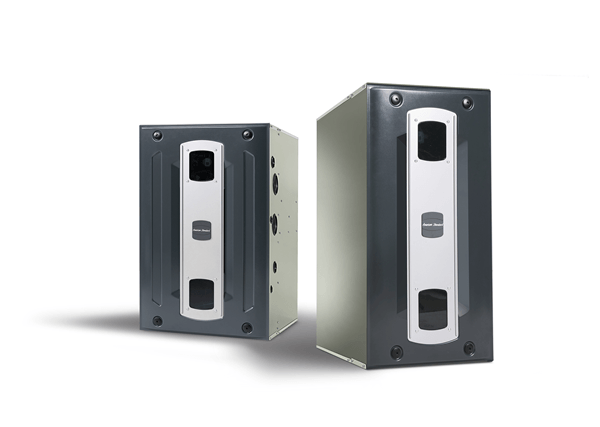Changing your furnace filter keeps it working efficiently - learn the 4 signs it's time…
Choosing a Gas or Electric Furnace
Home » HVAC Blog Articles » Choosing a Gas or Electric Furnace

You want your home to be warm and comfortable this winter, but you also want to minimize the costs of installing a new furnace and keep your energy bills low. If you’re replacing your existing unit, you’re probably debating between electric and gas heat, but which one is better? Our furnace repair company in Garner is breaking down the pros and cons of both options to help you make the best choice.
How a Furnace Works
Whether you choose a gas or electric option, both are forced air systems that kick into gear when the thermostat registers below a set temperature and sends a signal to the furnace. With a gas furnace, the signal triggers the pilot to ignite gas within the furnace, creating a combustion within the heat exchanger that warms cool air entering the chamber.
An electric furnace works when the signal triggers to ignite electric heating elements to warm the air within the exchange. In both furnaces, the warmed air is then pushed through the ducts by a blower where it circulates through the home. At the same time, cool air is pulled into the intake vent to the heat exchange where it is warmed and recirculated.
Choosing a Gas Furnace
Gas furnaces are the more common option, but that doesn’t necessarily mean they are best for your home. Let’s consider the benefits and drawbacks of a gas furnace first.
Benefits of a Gas Furnace
Gas furnaces tend to heat air more efficiently, which means they can warm a home more quickly and keep it warmer. Also, they’re generally reliable, lasting around 20 years with proper maintenance. This makes them a wise choice in cold climates, like the Northeast and Midwest.
Drawbacks to a Gas Furnace
The main concern with gas heat is the safety issue. Anytime you’re dealing with natural gas or propane, there’s a concern about carbon monoxide, so it’s essential that your furnace is installed by an experienced technician who can seal the equipment properly and ensure there are no leaks. Additionally, you’ll need regular professional maintenance to keep it running smoothly and to have it checked for any leaks that could be a safety hazard.
Additional concerns for a gas furnace are that they are more expensive to purchase and install than an electric furnace, so while you’ll have less expensive energy bills, you’ll pay more upfront for the unit.
Choosing an Electric Furnace
The benefits and drawbacks of an electric furnace are basically the opposite of a gas furnace.
Benefits of an Electric Furnace
If you’re concerned about the upfront cost of the unit and installation, an electric furnace may be the better option as they are often much less expensive, and, with proper maintenance, they can last up to 30 years. Additionally, electric furnaces are safer as there is no natural gas involved, which also means quieter operation.
Drawbacks of an Electric Furnace
The main concern of an electric furnace is that they are less efficient in how they heat your home, so you may see higher energy bills. Because North Carolina has more mild winters, this may not be as serious of an issue as it is in a place with a colder climate, but it’s important to consider the long-term costs of keeping your home comfortable through the winter.
Get a Free Quote for Furnace Installation in Garner Today
If you need a new furnace and are debating between gas and electric, we can help you make the right decision for your home and budget. Call us at 919-772-2759 or fill out the form below to contact a member of our team and schedule a free quote today.
Contact Our Heating and Air Conditioning Repair Company Today!
We would love to hear from you! Please fill out this form and we will get back to you shortly.
Related Posts
- 4 Signs You Need to Change Your Furnace Filter
- Why Is My Furnace Blowing Cold Air
If your furnace is blowing cold air, we're sharing some possible causes and troubleshooting tips.
- How Long Does a Furnace Last?
A furnace is an integral component of your HVAC system. To keep your home well…
